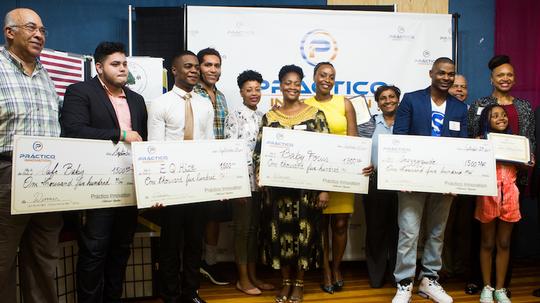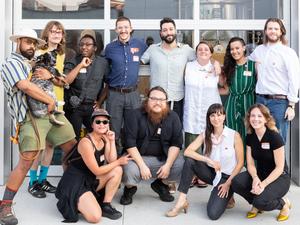
Entrepreneurs from underrepresented communities have a history of founding global, for-profit companies that churn out commercially successful products — tires, liquid detergent, cell phone chargers and drinkable yogurt, just to name a few.
Yet only one percent of venture capital funded startup founders are black, according to data from a CB Insights study on VC investments in the United States.
And only about one percent of all Latino-owned businesses created between 2007 and 2012 in the U.S. received venture capital or angel investments, according to a report by the Stanford Graduate School of Business that surveyed roughly 1,800 businesses.
Feeling like the opportunity cost was too high, a trio of entrepreneur veterans founded Práctico Innovation, an accelerator-like program that carefully selects innovative ideas from underrepresented entrepreneurs, and helps them grow by linking them to science and technology.
“We thought that with the development of an entrepreneur ecosystem in Rhode Island that too many new idea discoveries were being missed from the underrepresented populations that have a long history of coming up with world-class product and service ideas,” Walter Callender, founder and chief thinker at Práctico Innovation, told Rhode Island Inno. “We felt if we could combine a formula that mixes imagery with ingenuity and innovation, we could engage invisible communities to create products to practical problems that most people did not think about it.”
Callender, an early internet pioneer, teamed up with Brown University graduates Kipp Bradford, a serial entrepreneur, and Don Stanford, a gaming innovator, to launch the company in 2014.
Over the last four years, the team at Práctico Innovation has reviewed over 120 Latino, black and asian businesses, and provided micro investments, as well as strategic coaching, workshop training and network introductions to 15 startups. Forty-five percent of the companies Práctico has invested in are owned by women.
“We thought that with the development of an entrepreneur ecosystem in Rhode Island that too many new idea discoveries were being missed from the underrepresented populations..."
According to Callender, there is no shortage of talent and potential considering 25 percent of people in the Ocean State are from underrepresented communities, while 13 percent are immigrants.
The company works with organizations in Rhode Island linked closely to the immigrant and minority populations, such as New Bridges for Haitian Success, the Center for Women and Enterprise and Urban Ventures, to help find promising businesses.
At Práctico Innovation’s big showcase event in September, the team selects businesses to partner with and potentially invest in.
After that, however, Callender said the program operates much differently from your one-size-fits-all incubator.
“What we have learned about Rhode Island invisible communities is that we had to develop a customized engagement model, largely because many folks in these communities are working more than one job and have many family obligations,” he said. “The notion of providing workspace, workshops or events that end at 5 [p.m.] do not work for the populations we are targeting.”
The unique approach appears to be paying off.
One company Práctico invested in, Purifad, is the first company in the world to develop a robotic raised floor maintenance system, according to the company’s website.
Another company Práctico took under its wing, Vitae Industries, creates compound custom dose tablets and gummies that requires one-third the effort of using a machine, allowing people to get their prescriptions faster.
Vitae Industries, which was co-founded by Jeanine Sinanan-Singh, a woman of Trinidad descent, raised $2 million in its seed round.
According to Callender, and based on data from #ProjectDiane at digitalundivided, that makes Sinanan-Singh just the twelfth woman of color in the U.S. to have founded a company that raised over $1 million from outside investors.
Callender said Práctico does not take any equity in the beginning of its investments. However, down the line, the company typically will get a commission based on customer sales leads they provide to their companies. As a company's compounded annual growth rate and revenue grows, the company will look at increasing its investment and also broker introductions to other equity investors.
Currently, Callender said he is happy with the work Práctico Innovation has done in Rhode Island. Once the company has built the right kind of momentum, he thinks there is potential for expansion, first regionally and then nationally, he said.








